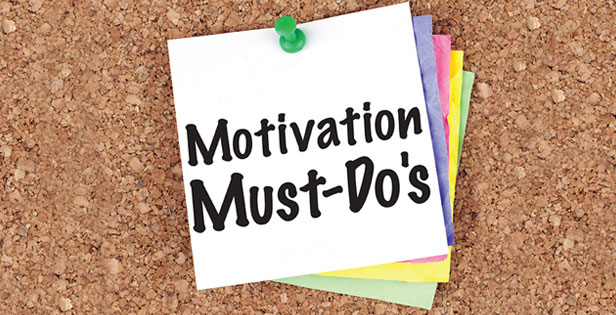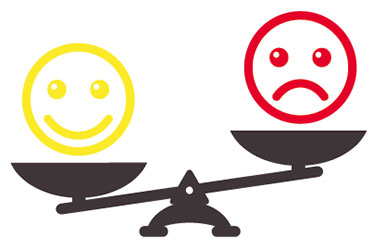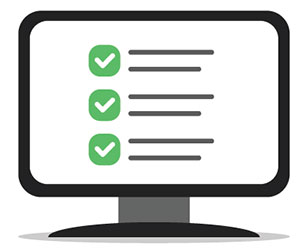October 09, 2018
Motivational Tips for Sales Pros
Finding it difficult to stay motivated in the middle of the daily grind? You’re not alone. Here’s how to take back control of your day and be more energized and productive in the process.
It’s no secret: We’re worn out.
A recent study by CareerBuilder found that 61% of American workers describe themselves as “burned out” at their current job. Yet more than a third have not taken or do not plan to take a vacation this year, and 36% say they’ve returned from vacation with so much work, they wish they hadn’t gone at all.

For salespeople in particular, a work/life balance seems especially difficult to strike. In HubSpot’s recent “Exposed: Life in Sales” study, more than 80% of reps report working more than 40 hours a week, a third said they have no work/life balance at all, and 68% describe their lifestyle as “challenging.”
Don't Miss: Coffee and the Sales Professional
It’s putting everyone on edge. The American Institute of Stress found that job pressure is the number-one cause of stress in the U.S., leading to 77% of people having stress-caused physical symptoms and 73% with psychological symptoms. Nearly half (48%) feel their stress has increased over the past five years.
So what’s to be done? How can sales professionals manage day-to-day stress, feel more positive about their jobs and get closer to that coveted work/life balance?
Podcast
Lori Richardson, founder of the sales consulting firm Score More Sales, offers her expertise for reps who want to take back control of their days in order to be more motivated and productive.
Turns out it’s not as hopeless as it may seem; it just takes breaking some entrenched habits and getting back to basics. Put structure back in your day by writing out a to-do list and prioritizing it. Take an actual mid-day break and periodic mini breaks whenever possible. Use tools to keep track of your projects. Change your perspective on challenges. And don’t be afraid to recharge on the weekends and during vacation. All these things taken together can help improve energy, motivation and productivity, and lower stress levels.
“It’s hard to pull yourself up every day,” says Jordy Gamson, CEO of The Icebox (asi/229395). “But it all comes down to energy management and perspective. Everything we do gives us positive or negative energy, and you can either allow things to drain you or you can change your perspective.”
The Morning
Rise and Shine

For Scott Hulbert, managing director at ideavation (asi/229801), channeling positive energy is first on the list. As soon as he wakes up, he spends 20 or 30 minutes stretching to limber up and get his blood flowing. Then he makes his daily super smoothie for breakfast to keep his energy up through the morning hours.
Kent Scearce, an account executive at Brandito (asi/325944) and self-described morning person, has a very specific routine to foster positive energy. After getting up at 6 a.m., sitting down with a breakfast sandwich and tuning in to ESPN’s SportsCenter, he takes a few minutes to enjoy the quiet of the early morning before the hectic day starts. Then, he makes the half-hour drive to his office. But unlike many of his peers – HubSpot’s Life in Sales survey found that 54% of reps check email as soon as they wake up – he deliberately doesn’t check messages on the way, choosing instead to listen to the radio.
“There’s nothing I can do from the car anyway,” he says. “I’m always excited to get to the office, and I don’t want anything to deter me. Even if there’s a problem I know I’m going to have to address, I look at finding a solution as another value-add we can offer and that motivates me.”
“Everything we do gives us positive or negative energy, and you can either allow things to drain you or you can change your perspective.”Jordy Gamson, The Icebox
Lauren Barron, senior account coordinator at Paperclip Promotions (asi/290142), says she makes sure she’s out of the house on time every morning to avoid the harried feeling that comes with running late. “Before I leave home, I go over what has to be done that day and I check emails before getting to the office,” she says. “That’s so I know what’s there, but I don’t actually address anything until I arrive.”
Drew Goldberg, director of HR at Top 40 distributor Axis Promotions (asi/128263), says he actually enjoys his 80-minute commute into Manhattan on the train. “That’s my time,” he says. “I read sports, music or pop culture articles. I listen to music and music-related podcasts. When I get to the office, I have coffee and a light breakfast and I check my emails.”
Once positive energy has been nurtured with a morning routine, maintain it as the workday begins by prioritizing. When the days get hectic, having a daily list of priorities – and knowing what’s OK to skip to avoid over-extension and unwanted tension – is best for staying motivated and moving forward.
Video: Motivational Must-Dos
“Clients’ needs and their event dates come first,” says Cindy Jorgenson, senior director of client services at Top 40 distributor BDA (asi/137616), about her priorities. “I block enough time to address the critical things, then review my calendar for the day. If there’s a meeting, am I required to be there? If it’s nice that I’m there and I have the time, I’ll try to be there. But if something else is a priority, that comes first.”
Don't Miss: 8 Easy Motivational Tips
It also helps to prioritize based on natural energy levels at certain times of the day. Goldberg plans to do high-level thinking and strategizing from 10 a.m. to noon, when he has “A+ brain power.” Then he reads resumes right after lunch, what he calls his “tired time,” followed by tougher meetings, like performance reviews, from 3 to 4.
“Critical thinking needs to be done before lunch,” adds Hulbert. “If something heavy comes up at 2, we leave it for the next day when we’re fresh.”
For sales managers, it’s also important to make sure the team starts the day on a positive note. Every morning, the employees at ideavation gather for a positive focus session where everyone shares one achievement, either professional or personal, from the day before. “Maybe someone got that merchandise program, or maybe they finally renewed their driver’s license after putting it off,” says Hulbert. “You need to have a positive mindset because sales is a grind, so the focus sessions help us with that.”
The Daytime
Rolling With the Punches

Even if the day is planned out to the minute (some would say especially if it is), unforeseen things can crop up that need to be addressed. To stay the course and minimize energy-draining distractions, Scearce has an up-to-date whiteboard at his desk that’s a constant reminder of the status of each project. He regularly updates each project’s timeline, noting the next step for each one so he knows what his current priorities are and surprises are easier to handle when they arise. It also helps him maintain the energy needed to handle multiple projects.
“That energy comes across in conversations,” he says. “Whether it’s a pen or a Patagonia jacket, you want the prospect to get excited too, because sometimes they’re the ones going to the decision-maker and you’re relying on them to show enthusiasm.”
“I don’t work for my supervisor; I work for my family.”Drew Goldberg, Axis Promotions
When things don’t go as planned, it can certainly bring motivation down. But a healthy perspective keeps it from becoming a major energy drain. “We pride ourselves on offering top-notch customer service,” says Barron. “But there are situations where we had to nail the order and something fell off the wagon. That’s an opportunity to do what’s right and let the customer know. They’ll come back when it blows over because you made them look like rock stars.”
Even optimists fall prey at times to the negative energy of uncertainty and self-doubt. Gamson says it starts to creep in when he’s making prospecting calls, for example. “I engage in positive internal speak,” he says. “If it doesn’t go well, I’m still optimistic. Tomorrow is another day. I think of it as just another thing to do, instead of allowing it to stress me.”
As Goldberg goes through the day trying to keep his energy up, especially in tough situations, pictures of his two-year-old son Luke remind him of what really matters. When his day becomes stressful, he thinks about what’s important to his son, like Mr. Giraffe, his blue car and Goldfish crackers.
“It just helps me put things in perspective,” says Goldberg. “It helps me attach my hard work to his happiness and providing for him. I don’t work for my supervisor; I work for my family.”
Mid-Day
Take a Step Back

Even if the day is particularly busy, a mid-day break should be scheduled in, whether it’s having lunch, running errands or just taking a walk around the block. “I take lunch when I can,” says Hulbert. “Usually I just eat at my desk, but my door is closed and I watch SportsCenter. It takes my brain off business for a while. We also have putters and golf balls in the office, so sometimes I’ll hit those around.”
Scearce says sourcing products for clients can be an energy drain, so taking a break lets him come back with a fresh mind for the afternoon. “I’m at it all day long and have like 13 suppliers I’m juggling,” he says. “So I’ll leave the office at lunch. I’ll go hit some golf balls, walk downtown. We have a gym at our office, so sometimes I’ll run for 20 minutes. It’s a way to restart the day, and then I have a few more hours to get stuff done. The endorphin boost definitely helps, especially when I get home and I can run around with the kids.”
Even when taking a full lunch isn’t possible, a mind-clearing break can suffice. “A lunch break is difficult to schedule. My first call is sometimes at 6 a.m., and sometimes the last is at 5:30 or later,” says Jorgenson. “I’m booked all day. I drink lots of protein shakes, so I don’t usually take a full lunch. But I’ll do a loop around the building with co-workers. Sometimes we’ll make it a walking meeting and talk about what’s coming up.”
The Evening
Wrap It Up

At the end of each day, take steps to prepare for the next so precious time isn’t wasted in the morning trying to figure out what needs to be done and remembering where projects stand in the pipeline. In the last 20 minutes before catching the train home, Goldberg uses his Google Calendar to create a fresh to-do list, as well as the Eisenhower Matrix, a time management method that helps users figure out what tasks are urgent and important for more effective prioritizing. “If I don’t plan out the next day, I’ll end up spending the first 20 minutes in the morning just trying to get organized,” he says. “I also clean off my desk completely before I leave. When your surroundings are less cluttered, you feel more in control and confident.”
“I don’t want to worry about anything when I get home, and I’m not calling clients at night.”Kent Scearce, Brandito
Scearce makes sure to tie up loose ends before he leaves. “Things are either complete or at least in a good spot to address the next day,” he says. “I don’t want to worry about anything when I get home, and I’m not calling clients at night. I usually don’t need to stay late because I manage my time well and I’m organized. It’s easy to let time get away from you here.”
Hulbert, too, will prioritize what has to happen the next day before leaving. Then it’s personal time. “I’ll go to the gym or golfing, or maybe just watch mindless TV with a glass of wine,” he says. “But I put together the list before I leave so it’s not hanging over my head overnight.”
Weekends & Vacations
Take a Break

Just as periodic breaks during the workday are important for boosting energy, taking weekends and vacations seriously is also important for recharging and overall motivation. “I purposely turn work off over the weekend,” says Gamson. “Being half off doesn’t help you recharge. Some of our employees come in on the weekends, but I make sure they know we don’t require that, and that they won’t do themselves or the company any good if they’re burnt out.”
Barron makes sure she reserves her weekends for things she enjoys doing, like cooking and hiking, things she can’t often do during the week. Although hers tend to get busy, she makes sure to reserve a few for personal time. On vacation, she occasionally checks emails but rarely answers them. “That just opens the floodgates,” she says. “But it’s a bad habit to check them at all. No one here expects me to.”
While it’s challenging for Jorgenson to totally disconnect, she does make time to get outside. As a resident of the Pacific Northwest, she’s in a perfect location for it. “I love Mother Nature, the planet and its creatures,” she says. “Spending time outside resets my soul. I’m near mountains, so I can hike on the weekends. I recently went kayaking in the San Juan Islands with friends to find orcas, though I worked in the car the whole way there.”
When Jorgenson heads to Hawaii soon for vacation, she’ll be checking email to monitor and stay ahead of potential crises. “But I push my team not to work during PTO,” she says. “I tell them not to call in to a meeting on their day off. I’ll take notes and email them.”
While Goldberg says he used to be a seven-days-a-week worker, that’s changed since the arrival of his son. “I spend time with family, usually outdoors,” he says. “This way I have more energy on Monday. It’s working smarter, not harder. It’s rare that I work at all on weekends.”
Hulbert owns ideavation, so he’s more likely to take long weekends when possible, rather than major trips, and he gives his team the opportunity to recharge as well. “We’re super flexible with the staff – they can take the time they need, as long as the work gets done,” he says. “We also have summer hours and we close between Christmas and New Year’s. It helps the team avoid burnout and reminds us all that there’s more out there than just work.”
Sara Lavenduski is the senior editor for Advantages. Tweet: @SaraLav_ASI. Contact: slavenduski@asicentral.com
